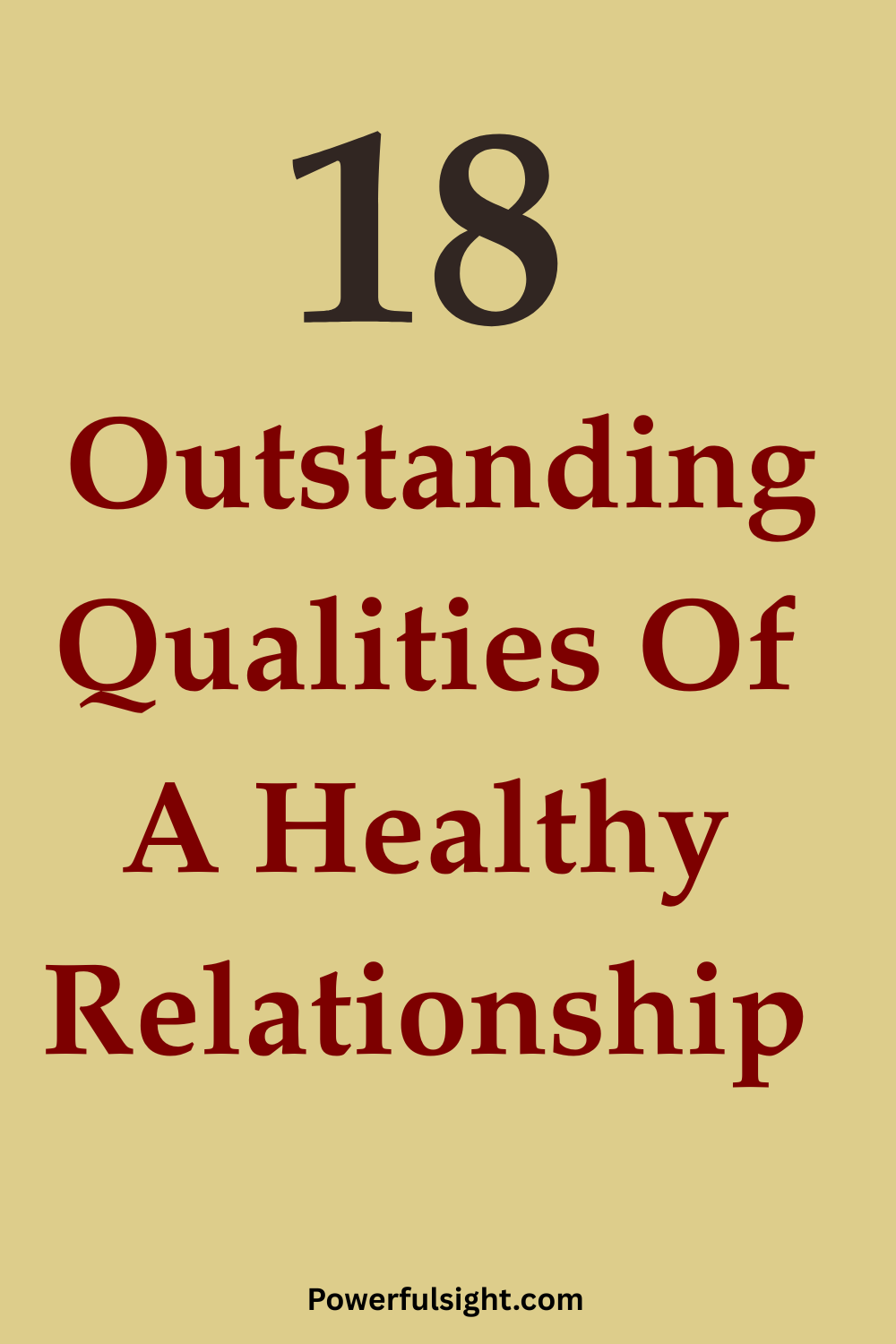Love can be complicated, which is why not all relationships are healthy. If you want to have a successful relationship, it is important to know what a healthy relationship looks like.
There are 18 outstanding healthy relationship qualities, and we’re going to talk about them. Keep reading to find out more!

18 Outstanding Qualities Of A Healthy Relationship
1. Mutual Respect
Respect is one of the key ingredients of a healthy relationship. It means that you respect each other’s opinions, boundaries, and differences. Mutual respect can help you create understanding, release tension and other negative emotions, and help you grow together. Remember, respecting each other means being respectful and accepting of the other person and your differences.
Why it matters: Respect in relationships makes both people feel heard and valued. A lack of respect may lead to frustration, and eventually anger and resentment.
Related: 9 Ways Your Body Tells You You’re in the Wrong Relationship
2. Clear and Open Communication
Communication in a healthy relationship is key to success. But it is more than just talking to each other or sharing your thoughts and feelings. Effective communication is also about really listening to each other and making sure you understand what the other person is trying to say. It is also important to talk through any issues as soon as possible so that you can resolve them together and stay connected.
Clear communication prevents issues from turning into bigger problems.
3. Emotional Safety
Emotional safety in a relationship is important for creating a loving and secure environment. In this sense, it means that both of you should feel emotionally safe to be open about your thoughts and feelings, knowing that you won’t be judged, ridiculed, or ignored. Emotional safety also means that both people know they can rely on each other for support no matter what.
Emotional safety strengthens the trust in the relationship.
4. Shared Values and Goals
Opposites attract, of course, but sometimes you need more than that for long-term compatibility. It is important to have the same values, views, and goals for your future together. This can mean many things, like having the same values on family, children, education, how you want to live your lives, career goals, etc. When you are compatible in your values and goals, you’ll find that your relationship is much stronger and healthier.
Why it matters: Shared goals and values give you both a sense of direction in your life together and help you be a team.
Related: 12 Daily Habits To Stay Happy In A Relationship
5. Authenticity
Authenticity in a healthy relationship is important as well. This means that you are both able to be yourself around each other and that you don’t need to pretend to be someone you’re not in order to be loved and appreciated by your partner. Authenticity is all about being comfortable enough to be yourself, with all your quirks, passions, and imperfections.
Authenticity helps you connect with your partner on a deeper level.
6. Emotional Support
Emotional support is an outstanding healthy relationship quality you should expect to find in a strong connection. This means that both of you are there to support one another when the going gets tough, whether by lending an ear, giving advice, or just being present during difficult times. Emotional support is one of the keys to creating a happy and long-lasting relationship.
Why it matters: Emotional support helps both of you overcome any challenge and feel secure.
Related: 9 Things That Make a Man Happy in a Relationship
7. Physical Affection
Physical affection is another key to building a healthy relationship. Whether it’s hugging, kissing, or simply holding hands, touch is important for making you feel connected and close to your partner. Even small physical gestures like a quick peck on the cheek when leaving for work can make a big difference in your relationship.
Why it matters: Physical touch stimulates the release of “feel-good” hormones called oxytocin, which can boost your mood, help you feel more relaxed and connected, and reduce stress and anxiety levels.
8. Trustworthiness
Trust is another quality you need in a healthy relationship. It is the foundation on which all other good qualities are built. Trust in a relationship means that both people know they can count on each other to be there when they need them and to be open, truthful, and honest with each other at all times. Trust is something you can build together over time.
Trust is what allows both of you to be emotionally vulnerable and secure.
9. Independence and Personal Growth
Healthy relationships encourage personal growth in both people and allow for individuality and independence. This doesn’t mean that you have to have completely separate interests or spend all your time apart. But it does mean that you are both free to pursue your own passions, hobbies, and careers, and to grow and develop as individuals.
Personal growth allows you to be your best self in a relationship and ensures the relationship remains healthy.
10. Equality and Balance
Equality in a healthy relationship can mean many things, such as emotional equality, financial equality, and the balance of effort in maintaining the relationship. Equality does not mean that you have to do everything together or that you have to split chores and responsibilities 50/50. It does mean that both people in a relationship should feel they are giving and receiving in an equal and balanced way.
Why it matters: Equality makes both people in a relationship feel like a team.
11. Empathy
Empathy is the ability to understand and share the emotions of others and is an important quality in a healthy relationship. When you are empathetic, you can put yourself in your partner’s shoes and try to see things from their point of view, even if you don’t agree with them or don’t feel the same way. This is a great quality because it helps you connect with your partner emotionally and also defuse many tense situations.
Empathy helps you connect with others and build strong relationships.
12. Humor and Playfulness
Humor and playfulness are often underestimated as great qualities in a healthy relationship, but they truly are. Laughing together and not taking life too seriously are important factors for a happy and fulfilling relationship. Remember to have fun with your partner and enjoy the time you spend together.
Humor and playfulness help release stress, bring you closer, and help you stay connected.
13. Patience and Understanding
Patience in relationships is one of the most important qualities for success. Patience also includes being understanding with your partner when they are going through a hard time, making mistakes, or behaving differently than you expect. Similarly, you should also be patient with the pace of your relationship and allow things to develop naturally, without rushing or forcing them.
Patience creates an environment where both of you can feel understood and cared for, even when things don’t go as expected.
14. Conflict Resolution Skills
Conflict resolution skills are essential in a healthy relationship because it’s important to know how to resolve disagreements respectfully and constructively. In a healthy relationship, both partners should try to avoid blame and defensiveness, working together to find a solution that both are happy with.
Conflict resolution skills help build respect between partners, even during difficult times.
15. Affirmation and Appreciation
Regularly showing your appreciation for each other is a great quality in a healthy relationship. Affirming and appreciating your partner helps strengthen your relationship, and this can be done in many small ways. Compliments, small gifts, or simply telling your partner how much you love them will make them feel valued and loved.
Why it matters: Regular affirmation helps your partner feel good about themselves and reinforces the love and admiration you feel for them.
16. Shared Responsibility
Shared responsibility in a relationship is another important quality. This includes supporting each other’s dreams and goals, as well as other responsibilities like managing the household, making decisions together, or dividing chores. Shared responsibility means that both people in a relationship are actively taking care of it and pulling their weight.
Why it matters: Shared responsibility ensures both people feel like a team.
17. Compromise and Flexibility
Compromise is a vital aspect of a successful relationship. Flexibility in a relationship means that both partners are willing to meet each other in the middle and compromise when they don’t see eye to eye. Compromise also includes being able to make sacrifices for the good of your relationship.
Why it matters: Compromise and flexibility ensure both people feel respected and valued, even when they don’t agree on everything.
18. Boundaries and Space
It’s important for both people in a relationship to have intimacy and connection, but it’s equally important to respect each other’s boundaries and personal space. This includes the need for privacy and personal time apart, as well as other healthy boundaries that allow you to remain individuals within the relationship.
Why it matters: Boundaries and space help both partners feel respected and take care of their own well-being.
Related: 9 Signs You Are Not Getting What You Deserve In A Relationship
Conclusion
A healthy relationship is not something that happens overnight; it takes time, work, and dedication from both people involved.
If you want to have a healthy relationship, make sure your relationship have this outstanding qualities.
Save the pin for later

- 9 Things Daughters Of Narcissistic Mothers Don’t Do - 02/03/2026
- Daughters of Narcissistic Mothers Healing Affirmations - 27/02/2026
- 5 Perfect Mother’s Day Gift Ideas (That She’ll Truly Love) - 27/02/2026
